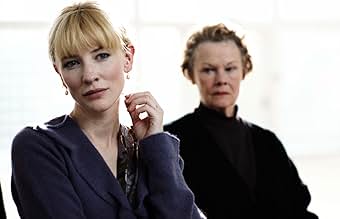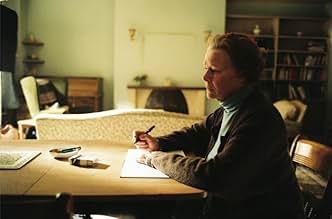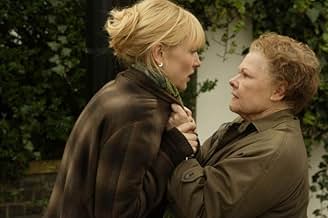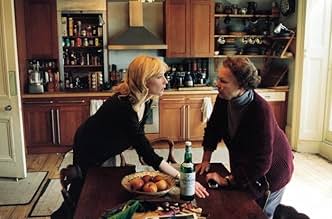Uma professora do ensino médio faz amizade com uma professora de arte mais jovem, que está tendo um caso com um de seus alunos de quinze anos. No entanto, suas intenções com essa nova "amiga... Ler tudoUma professora do ensino médio faz amizade com uma professora de arte mais jovem, que está tendo um caso com um de seus alunos de quinze anos. No entanto, suas intenções com essa nova "amiga" também vão muito além de uma amizade platônica.Uma professora do ensino médio faz amizade com uma professora de arte mais jovem, que está tendo um caso com um de seus alunos de quinze anos. No entanto, suas intenções com essa nova "amiga" também vão muito além de uma amizade platônica.
- Direção
- Roteiristas
- Artistas
- Indicado a 4 Oscars
- 16 vitórias e 74 indicações no total
- Direção
- Roteiristas
- Elenco e equipe completos
- Produção, bilheteria e muito mais no IMDbPro
Avaliações em destaque
Dench and Blanchett, as Barbara and Sheba, share not only a gift for deep behavioral detail but a skill at withholding or telegraphing charm and beauty, as required. This may be one of the numerous reasons why they're as compelling as they are. It's definitely part of why this is some of their finest work. It's part of the drama's mechanism. Were Sheba not the breed of beauty she is, a naive, impressionable, coddled pixie, then we couldn't appreciate how intensely Barbara wants her. It's not exactly love so much as controlling, envious fixation on Sheba's stunning upper-class ease. And were Barbara not a teakettle of seclusion boiling through decades of disillusionment, we couldn't identify with how distorted the manifestation of that affection becomes.
That's the marvel of the movie: It's about the venomous influence of loneliness, viewed through a tale of two people in love. But unfortunately for both, not with one another. Sheba becomes smitten with a cute but cagey student. Played with what seems like natural hyper-confidence by Andrew Simpson, he sees an occasion in the way she looks at him. She has no clue of how defenseless she truly is. It's not only dishonest and unethical, she tells herself, it's totally ludicrous, but when he cups her face and says, "You're beautiful, Miss," she melts.
Barbara, meanwhile, fosters an obsession in her diary, relating thoughts precariously bordering on fantasy. Barbara's seclusion within the school is total, but Sheba is somebody who hasn't experienced her acidity. Barbara can smother someone with good turns and not be rejected. She helps Sheba win control of her students. "One soon learns that teaching is crowd control. We're a branch of social services." Sheba asks her to Sunday roast, where Barbara describes Sheba's family with characteristically rancorous humor. Dench's delivery of these delectably spiteful lines is an triumph in vocal meticulousness and tone that is its own prize. Even when this apparent ice queen drops minute words of vulnerability like "Is that why she hasn't returned my calls?" there's an extra intensity in how strongly we can all relate to the insecurities of her inner voice.
There are giftedly handled, extraordinarily candid scenes of rage, humiliation and disgrace, and cruel physical and emotional clashes of immense force. The teachers are somewhat caricatured, but that's because they're filtered through Barbara's misanthropic viewpoint. If it's her omniscient voice we're hearing, it's through her omniscient eyes we're seeing what she describes, and it's the figures who allow her access to their humanity who have profundity and delicacy in their depictions. A wholly earnest Dench brings to Barbara that frigid reserve that's somehow one with a despairing need for consolation and affection. Early on, Sheba is basically an alluring figurine, watched from afar. When our voyeuristic chronicler discovers Sheba's business with the student, Sheba grows immense dimension.
We start to see Sheba's own manner of advantaged lonesomeness or just tedium. "Marriage, kids, it's wonderful," she presumingly explains, "but it doesn't give you meaning." Blanchett brilliantly uses her character's advantages to betray her. The grim lesson she's about to learn from Barbara seems belated, even valuable. People like Sheba, according to Barbara, and I'm sure you'll agree, think they know loneliness, but they know nothing of planning one's whole weekend around a laundry errand, or being so continually untouched that the inadvertent sweep of a stranger's hand ignites years of sexual longing.
What I adore about the film is this discerningly intricate moral kaleidoscope weaved in completely modern domestic terms. It's going on in your neighborhood, not just Islington. There are scandals like this every year, and we dismissively conjecture from what little we gather. The cunning concept here is that we're seeing it through the sieve of Barbara, and whose transgressions transcend contemporary know-it-all assumptions.
Patrick Marber delivers a deliciously wicked, witty and crisply written script in NOTES, and it only enhances his reputation for giving an audience a story well developed and with characters that you can't take your eyes off on the screen. His writing in CLOSER was so brilliant and clever, but in NOTES ON A SCANDAL he hands Judi Dench and Cate Blanchett words that are zingers and with a strong blend of anger, pain and humor. Please, Patrick, gives us another film quickly! The "teacher/student" romance was well developed and the chemistry between the two actors was believable and very sexual, and one could understand the youthful passion delivered by a young man with a strong mind and body. I did at times have to listen carefully to the young actor's lines, but he delivered them like a pro.
In the weeks ahead, I anticipate a "roar from the crowd" for this very dark and witty Judi Dench performance and who knows, she may upset "The Crown" in the end come Oscar time.
Você sabia?
- CuriosidadesJason Reitman read the script and wanted to direct it. He called up the producers on the phone with the intention of getting the job. The producers answered: "We are in editing right now, but I hope you'll like the film when it comes out."
- Erros de gravaçãoWhen Sheba is rampaging through Barbara's house in search of her journal, you can see a crew member in the mirror behind her as she goes to sit.
- Citações
Barbara Covett: People like Sheba think they know what it is to be lonely. But of the drip, drip of the long-haul, no-end-in-sight solitude, they know nothing. What it's like to construct an entire weekend around a visit to the launderette. Or to be so chronically untouched that the accidental brush of a bus conductor's hand sends a jolt of longing straight to your groin. Of this, Sheba and her like have no clue.
- ConexõesFeatured in Siskel & Ebert & the Movies: The Best Films of 2006 (2006)
- Trilhas sonorasFunky Kingston
Written by Toots Hibbert (as Frederick Hibbert)
Performed by Toots & The Maytals (as Toots and the Maytals)
Produced by Leslie Kong
Reproduced by kind permission of Blue Mountain Music Ltd.
Administered by Fairwood Music (UK) Ltd. (c) 1971
Courtesy of Universal-Island Records Ltd.
Under licence from Universal Music Operations Ltd.
Courtesy of D&F Music Frederick Hibbert
Principais escolhas
- How long is Notes on a Scandal?Fornecido pela Alexa
Detalhes
- Data de lançamento
- Países de origem
- Central de atendimento oficial
- Idiomas
- Também conhecido como
- Escándalo
- Locações de filme
- Parliament Hill, Hampstead Heath, Hampstead, Londres, Inglaterra, Reino Unido(Barbara's park bench overlooking central London)
- Empresas de produção
- Consulte mais créditos da empresa na IMDbPro
Bilheteria
- Orçamento
- US$ 15.000.000 (estimativa)
- Faturamento bruto nos EUA e Canadá
- US$ 17.510.118
- Fim de semana de estreia nos EUA e Canadá
- US$ 414.487
- 31 de dez. de 2006
- Faturamento bruto mundial
- US$ 49.814.568
Contribua para esta página






































